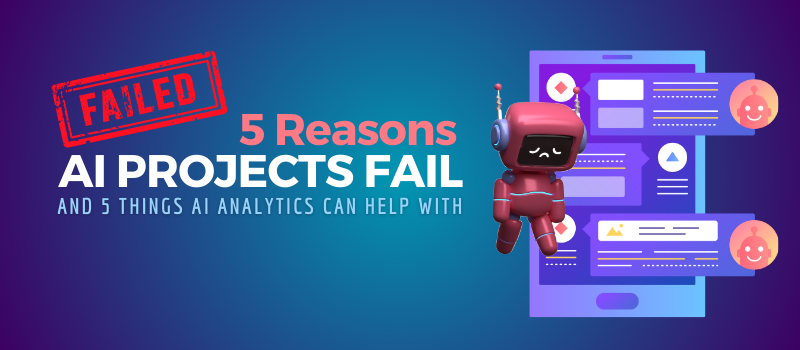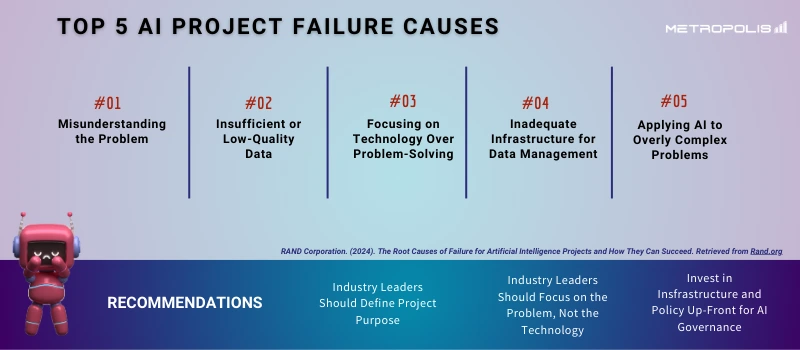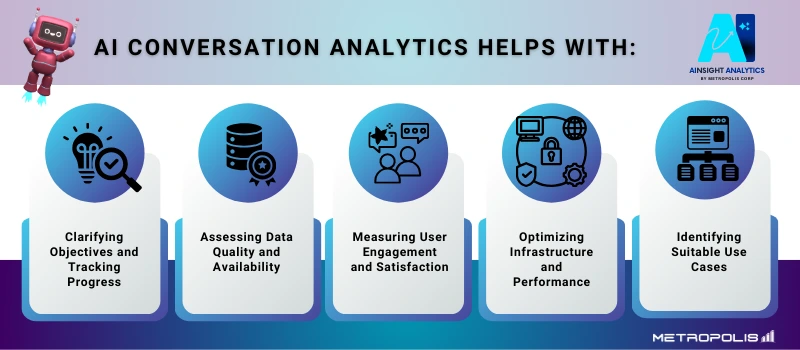


Recent research from the RAND Corporation reveals a sobering statistic: more than 80% of AI projects fail. This failure rate is twice that of traditional IT projects, highlighting the unique challenges associated with AI implementation.
As private-sector investment in AI skyrocketed 18-fold from 2013 to 2022, and with 58% of mid-sized corporations deploying at least one AI model to production, circumventing AI project failures has become a major priority for enterprises.

One of the leading causes of AI project failure is a fundamental misalignment between the problem that needs to be solved and the AI solution proposed. This often stems from a lack of clear communication between stakeholders, data scientists, and engineers. Without a shared understanding of the project's objectives, teams may develop solutions that fail to address the core business needs.
AI models are only as good as the data they're trained on. Many organizations embark on AI projects without first ensuring they have access to the necessary quantity and quality of data. This can lead to poorly performing models that fail to deliver meaningful results or, worse, produce biased or inaccurate outputs.
In the excitement surrounding AI, some organizations fall into the trap of prioritizing cutting-edge technology over practical problem-solving. This "shiny object syndrome" can result in complex, over-engineered solutions that fail to address the actual needs of end-users or align with business objectives. Will this technology evolve to solve all of our wildest dreams? Maybe. Probably. But for now, it's improtant to over this catch-all trap.
Successful AI implementation requires robust infrastructure for data storage, processing, and model deployment. Organizations that lack the necessary technical backbone often struggle to scale their AI projects beyond the proof-of-concept stage. This can lead to bottlenecks, performance issues, and ultimately, project failure.
While AI has made remarkable strides in recent years, it's not a panacea for all business challenges. Some organizations attempt to use AI to solve problems that are simply too complex or nuanced for current AI capabilities. This mismatch between problem complexity and technological readiness can result in disappointing outcomes and wasted resources.
Given these common pitfalls, how can organizations increase their chances of AI project success? The answer lies in designing a strong goal, than leveraging analytics throughout the AI lifecycle. Here are five ways analytics can help:

Analytics tools can help organizations define clear, measurable objectives for their AI projects and track progress towards these goals. By establishing key performance indicators (KPIs) and regularly monitoring them, teams can ensure their AI initiatives remain aligned with business needs.
Metropolis' AInsight Analytics, for example, offers customizable prompt engineering capabilities that allow businesses to tailor their analytics to specific objectives. This ensures that insights gleaned from AI-driven conversations are directly relevant to the organization's goals.
Before embarking on an AI project, analytics can help organizations evaluate their data assets. By analyzing existing datasets, companies can identify gaps, assess data quality, and determine whether they have sufficient information to train effective AI models.
AInsight Analytics integrates with various data sources, including Azure chatbots and Microsoft Copilots, allowing organizations to consolidate and analyze their AI-related data comprehensively. This holistic view can reveal data strengths and weaknesses, informing decisions about AI project feasibility.
Analytics plays a crucial role in understanding how end-users interact with AI systems. By tracking engagement metrics and sentiment analysis, organizations can gauge the effectiveness of their AI solutions and identify areas for improvement.
The sentiment and engagement analysis features of AInsight Analytics provide valuable insights into customer satisfaction levels and interaction patterns. This data can guide refinements to AI models and user interfaces, ensuring that the technology truly serves its intended purpose.
Analytics tools can monitor the performance of AI models in production, helping organizations identify bottlenecks, optimize resource allocation, and ensure smooth scaling of their AI initiatives.
With AInsight Analytics, businesses can track AI conversations across various platforms and deployments. This comprehensive view enables IT teams to optimize infrastructure and ensure that AI systems perform efficiently at scale.
By analyzing patterns in data and user behavior, analytics can help organizations identify the most promising applications for AI within their business. This data-driven approach to use case selection can prevent the misapplication of AI to overly complex or unsuitable problems.
With AInsight Analytics topic modeling and trend detection capabilities allow businesses to uncover emerging topics and pain points in AI-driven conversations. This insight can guide the selection of AI projects that address real, pressing needs within the organization.
As organizations continue to invest in AI, the role of analytics in ensuring project success cannot be overstated. By providing comprehensive insights into AI-driven conversations, sentiment trends, and user engagement patterns, analytics platforms enable organizations to transform chats and usage data into actual decisions. From initial problem definition to ongoing model refinement, analytics serves as a crucial feedback loop, allowing businesses to continuously improve their AI implementations.
Moreover, the ability to consolidate data from various AI deployments into a centralized hub for analysis helps break down silos and fosters a more cohesive approach to AI strategy across the organization.
As we look to the future, it's clear that the organizations most likely to succeed in their AI initiatives will be those that embrace a data-centric, analytics-driven approach. By learning from the failures of the past and leveraging the power of analytics, businesses can unlock the true potential of AI, driving innovation and creating tangible value in an increasingly AI-powered world.
For more information about AI Conversation Analytics and how they can help your organization, check out AInsight AI Analytics from Metropolis.